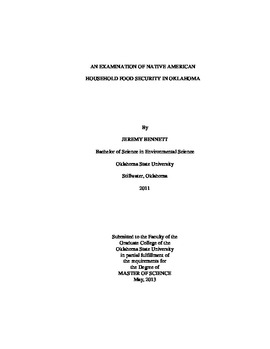| dc.contributor.advisor | Campiche, Jody | |
| dc.contributor.author | Bennett, Jeremy Shane | |
| dc.date.accessioned | 2014-09-24T14:17:55Z | |
| dc.date.available | 2014-09-24T14:17:55Z | |
| dc.date.issued | 2013-05-01 | |
| dc.identifier.uri | https://hdl.handle.net/11244/11067 | |
| dc.description.abstract | The hardships faced by citizens of the United States as a result of the recent "Great Recession" and other financial downturns have had the greatest impact upon groups from lower socioeconomic status (Andrews & Nord, 2009). One of the most basic human needs is food and the ability to access it. According to United States Department of Agriculture (USDA) reports, 14.9 percent of U.S. households were considered food insecure in 2011 as compared to fewer than 11 percent in 2007, thus more Americans are relying on some sort of food assistance program. There are multiple factors that contribute to food insecurity.The goal of this study was to understand how different socioeconomic factors affect food security for Native Americans in Oklahoma. The three factors evaluated in this study were Native American's household income, educational attainment, and employment status. By using the 18-item Core Food Security Module, Native American households were classified into different food security levels; an additional questionnaire addressed underlying problems or factors that contributed to food insecurity and issues relating to food assistance programs.It was found that 35% of the Citizen Potawatomi Nation (CPN) of Shawnee surveyed were food insecure in 2013. Unemployment rates for CPN households were found to be higher (30.8%) than the national average of 7.6%. CPN household income levels of $20,000 or more were found to be extremely lower than national levels, yet earnings below this level were higher. High school graduates and students entering into college were found to be higher than at the national level, however, there were more high school students dropping out and less college graduates than at the national level. It was discovered in this research that employment was closely correlated to food insecurity, along with educational attainment depending on various models. Just as predicted, food assistance programs are widely used throughout the tribe. Furthermore, this research alluded to the need for more research in terms of Native American food security and utilization of different food assistance programs. | |
| dc.format | application/pdf | |
| dc.language | en_US | |
| dc.publisher | Oklahoma State University | |
| dc.rights | Copyright is held by the author who has granted the Oklahoma State University Library the non-exclusive right to share this material in its institutional repository. Contact Digital Library Services at lib-dls@okstate.edu or 405-744-9161 for the permission policy on the use, reproduction or distribution of this material. | |
| dc.title | Examination of Native American Household Food Security in Oklahoma | |
| dc.type | text | |
| dc.contributor.committeeMember | Whitacre, Brian | |
| dc.contributor.committeeMember | Stoecker, Barbara | |
| osu.filename | Bennett_okstate_0664M_12780.pdf | |
| osu.accesstype | Open Access | |
| dc.description.department | Agricultural Economics | |
| dc.type.genre | Thesis | |
